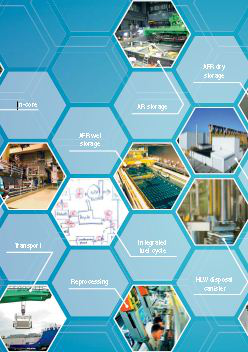Speaker
Dr
Holger Völzke
(BAM Federal Institute for Materials Research and Testing)
Description
The safe and secure storage of spent nuclear fuel and high-level waste from nuclear power reactors is one of the major long-term issues to be solved in the nuclear business. Today no country has a repository available for final disposal or in some countries reprocessing capacities for spent fuel are not sufficiently available as planned. In the meantime the safe interim storage for the long-term - may be 80 years or even longer - is the only available option from today’s perspective and dry cask storage is increasingly favoured throughout the world for various reasons.
This paper describes and discusses the major challenges of spent fuel management in Germany after the phase-out for nuclear electricity generation was decided in 2011 and a new repository siting procedure was implemented in 2013. Consequences from those decisions which were legally founded by amendments of the German Atomic Energy Act result in the need to transfer all remaining spent fuel from limited reactor operation (last reactor shutdown until the end of 2022) into casks for subsequent dry interim storage on-site. Storage licenses are generally issued site-specific considering specific dual purpose casks (DPC) and their inventories and they are generally limited to 40 years so far. But the need for extending that interim storage period in the future has become obvious. Even though, this is not an issue to be solved today questions about additional safety demonstrations will arise as soon as licenses need to be extended. Certainly, these questions will ask for reliable data about the long-term performance and safety of structures, systems, and components, e. g. the long-term performance of cask components and materials like bolted closure systems including metal gaskets, or fuel rod behaviour concerning cladding materials under stress and temperature conditions. In case of dual purpose casks for storage and transportation this includes aspects on how to demonstrate transportability during or after several decades of interim storage. Long-term investigations often require plenty of time and therefore need to be initiated timely.
Preliminary R&D results and experiences from more than 20 years of safe interim storage in Germany are discussed. In addition, the national perspective towards potential data and R&D needs to demonstrate safety for extended interim storage periods is related to international actions as the US Extended Storage Collaboration Program (ESCP) and several IAEA projects focussing on that issue.
Country/ int. organization
Germany
Primary author
Dr
Holger Völzke
(BAM Federal Institute for Materials Research and Testing)
Co-author
Dr
Dietmar Wolff
(BAM Federal Institute for Materials Research and Testing)

